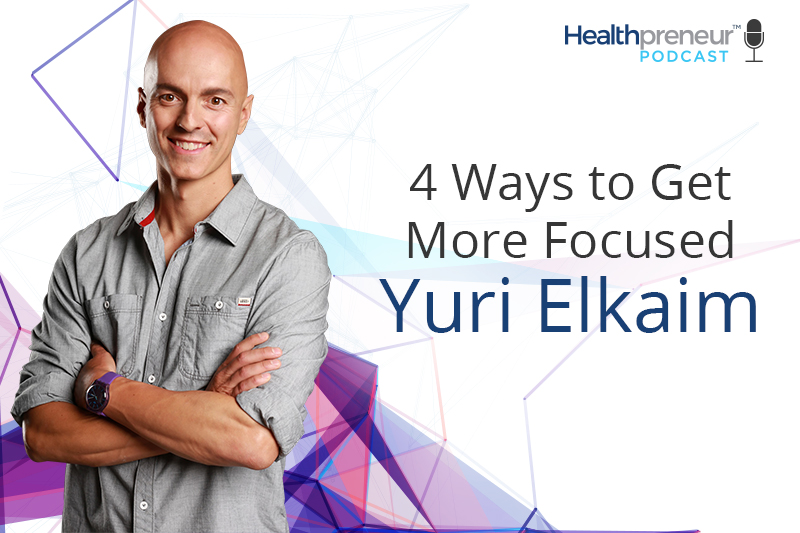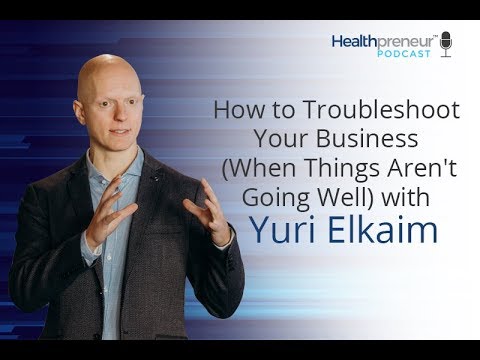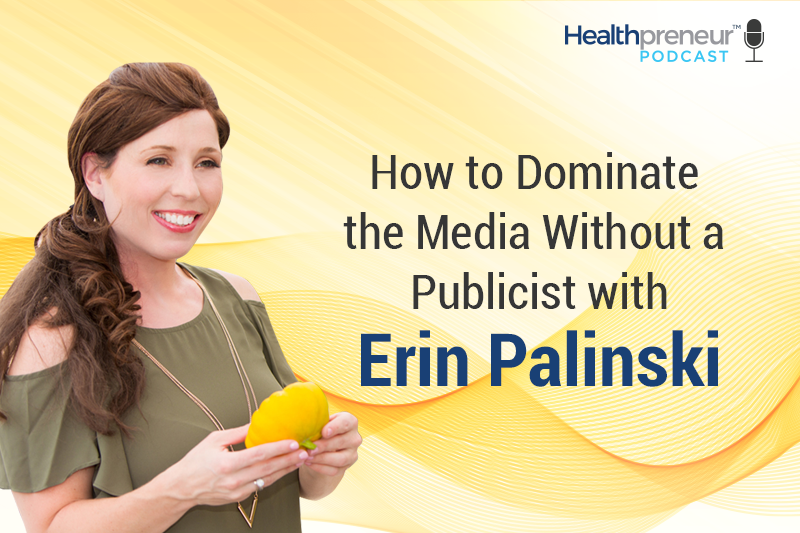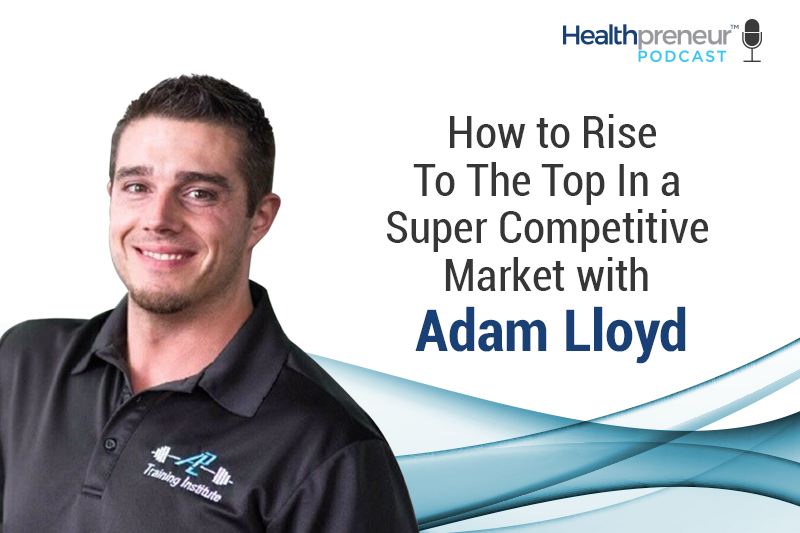4 Ways to Get More Focused

Welcome back to another motivating episode of the Healthpreneur Podcast! This week I’m flying solo and talking all about focus—how to get focused, how to stay focused, and how to hone your focus. Ultimately, at the end of the day, if you don’t know what you’re driving towards or why, there’s no way to get there.
As an entrepreneur, it’s easy to get bogged down in the details. Our daily routine can get filled with so much of the minutiae we forget what it is we’re actually striving towards. Do you ever get to the end of your day feeling completely exhausted, but thinking, “What have I really done? What did I even accomplish?” It’s so easy to fall into the trap of busy work and fussing with tiny ingredients that the big picture, your big idea, your business crumbles before it even has a chance to fully bake.
The Healthpreneur team wants to help with that. We know the struggle. We have been there ourselves!
Your focus is your lifeline. Take a brief moment. Take a break. Grab a pen and pad, or write notes on your phone, because what we’re talking about may seem small, but it is so, so important.
In this episode I discuss:
- Learning from my son how a scattered brain can be channelled into creative thinking
- 4 ways to stay more focused
- The Preferred Partner Program
- How clarity leads to focus, and fogginess leads to scattered-ness
- Tangible resources for creating more focus
- The importance of a predictable sales process
03:00 — 4:55 – Being Clear About Your Vision
04:55 — 06:21 – Identifying Core Values
06:21 — 08:45 – Your Brand Promise
08:45 — 11:30 – Identifying the Metrics that Matter
11:30 — 14:47 – Clarity and Resources
Transcription
Hey, Yuri here. Welcome back to another episode of the Healthpreneur Podcast. Today we’re going to be talking about how to stay more focused because at the end of the day, focus is one of the most important determinants of whether or not you are going to see the results you want to see not only in your business, but in any area of life that matters to you most.
So what I want to walk you through here is a four-step process to staying more focused, and I want to give you a great resource as well that I think will really help you stay focused. I’ll tell you more about that toward the end of this episode.
So without any further ado, let me quickly start off by saying if you ever feel scattered, if you ever feel like you’re chasing a thousand different things, believe me, you’re okay.
If you’ve ever been diagnosed with ADHD, ADD, hyperactivity, lack of focus, lack of concentration, you know what? That’s actually part of your superpower. It’s part of what makes us creatives so incredible.
Now, with that said, we have to understand that sometimes our weaknesses can hold us back, and we have to figure out how we can best mitigate them to move us forward. There’s nothing wrong with you. If you’ve been unfocused or you have a lot of ideas, that’s fine. That’s what makes you who you are.
Learning from my son how a scattered brain can be channelled into creative thinking
My oldest son, Oscar, is very much like that. He can’t sit still at the table. He’s always moving around. He’s chasing one thing after another. The traditional thinking would be like, “Well, there’s something wrong with this kid.” But I recognized, I think now, knowing what I know now, seeing that behavior, I’m thinking to myself, “You know what? That’s actually going to serve him really well in life because he’s a creative thinker, and those ideas and that creativity, when it’s channeled, can really lead to some amazing things.”
So let’s assume that we’re all creatives here. We’ve got lots of ideas and that’s usually the way we are as the visionary of our business.
4 Ways To Stay More Focused
1. Being Clear About Your Vision
I’m going to share four ways to stay more focused. The first thing we need to do to stay more focused is we have to be clear about what the vision is.
You have to be very clear about what you’re working towards and why this is important. As the leader of your business, the two most important questions you should be spending most of your time answering is what and why, not necessarily how.
Let me explain that. A lot of people get really bogged down in the minutia. Right? So they start focusing on all of the how. How do I do this? How do I set up this specific thing? How do I get through this tech nonsense? If you spend your time in the how, I guarantee you, you will very frustrated and if you’re following any kind of path, or model, or whatever it is, eventually you will fall off the bandwagon because when you focus on the details and you’re stuck in the weeds, we lose sight of what it is we’re focused on.
You need to focus on the what it is you want — right — that vision you have, what you want in life and business, and you need to focus on why that’s so important to you.
You need to live in the what in the why. I’m telling you, just that, alone, will make a huge difference in the amount of fulfillment you have on a day-to-day basis.
So you have to get clear about what it is you want, what that vision is, and why it’s important. The why is important because that’s going to give you the energy to move through challenges and obstacles in tough times. Right? As you know, business is up and down, as is life, and if your why isn’t strong enough, if you don’t have enough desire behind what it is you’re going after, it’s very easy to give up or change course. So that’s the first thing is you have to be very clear about your vision. That’s the first step.
2. Identifying Core Values
Step number two is you need to identify your core values. Your core values are, essentially, what matters to you most. What the core values will allow you to do, is they will allow you to make better decisions. They will allow you to basically … They’re a filter that will filter out pretty much all decision making you do. If you’re not using core values to make decisions, here’s a really simple task. Write down three to five core values for your business. Now, it just so happens that those same core values are probably going to be your personal core values because you’re the leader of your business, so the business is always a reflection of you.
Write down those core values. For instance, I’ll give you a couple of ours. One of our core values is to create wow. Right? We believe in creating wow for our clients and that means going beyond just good customer service. A second core value that we have is that our clients’ results are our number one priority. Everything, those are just two, we have eight core values, those are just two of them, but everything, every decision, every big decision we make is going to be filtered through those different lenses. Okay, is this going to create a wow experience? Is this focused on helping our clients achieve the results that they want? If it’s not, then that becomes an easier decision to make, so you have to get clear on what matters to you most. That’s step two, your core values.
3. Your Brand Promise
Step three is your brand promise. What’s the promise you make to your customers or clients? Now, what does this have to do with staying focused? Okay, so here’s the thing, is once you’re clear about what the promise is you’re making to the people you’re serving, then once again, that acts as a filter for making the right decisions about what to do and what not to do. One of our promises for the people we work with is to help them see a 2X ROI in four months or less of starting to work with us. That’s our promise. Everything we are going to do now, in terms of the delivery of a program, is going to be built with that in mind. What has to be true in order for them, in order for our clients to see a 2X ROI?
I’ll give you an example from our mastermind. Our mastermind, I work with people who are generating six-figures in revenue and want to get to seven and beyond. One of the secret, I guess, weapons I can bring to the table is we have what’s called this preferred partner program. If a client comes in and they have a product or an offering that will benefit my personal health list. I’ve got the health and fitness business. We have a list of about 220,000 people on our list, if we have someone come into our mastermind with an offer that I think could benefit our audience, then we’ll mail out for that. We’ll do a full-on promotion for that mastermind member because my priority is to get my clients results as fast as possible, so if somebody is paying me good money to have me coach them, if I can send out a few emails to my list to give them a nice bump in revenue, hey, I’m going to do that, obviously, if it supports my audience.
Now, at the same time, if it does well for me or if I know other people in our space who I think might benefit from that type of offer, I will make those introductions so now these clients coming in, within the space of a couple days or a few short weeks, now have built-in partners to promote their offers. So that’s an example of how I can really stay focused on what we’re offering our clients based on the fact that if our ROI for our clients is number one priority, here’s one of the things we can do. Okay? So what is your brand promise you’re making to your customers or clients?
4. Metrics That Matter
Finally, number four is you need to identify the metrics that matter. There’s a lot of metrics you can be tracking in your business. This is tricky. This is something you’re going to probably, you might modify over time so just allow yourself to be flexible with this.
What I want you to do is identify three numbers that matter most to your business and targets for each one. Let me give you a couple of examples from Healthpreneur.
One of our metrics is number of result accelerator calls booked from paid traffic. That’s one of the metrics that we’re looking at because we know that if we get X number of people on the phone, assuming they’ve come through our pipeline, they’re qualified, and we know that we’re going to enroll a certain percentage of those people. Right? Without forcing them to do anything they don’t want to do, right? We just know, based on history, that it’s essentially just a numbers game at that point. That’s one of the most important numbers that we look at is how many phone calls are we booking from paid traffic. That’s one of the numbers we look at.
Another metric that we look at is how many of our workshop clients are generating $10,000 or more per month in revenue. Now, that has nothing to do with our goals. That’s all about our clients, but remember if our clients, if our goal is to help them see an ROI as fast as possible, that should be one of the metrics that we measure. We have ongoing coaching calls with all of our clients. We make sure we know where they’re at in terms of clients enrolled, revenue, and stuff like that, and we want to make sure that a good percentage of the clients we work with are seeing that at minimum because most of them come into the program wanting to make anywhere from, I’d say as a starting point, 10 to 20 to $30,000 a month. That’s kind of where they’re coming in at. Obviously, they can scale from there. If that’s one of the most important things for us. We need to track that.
In your business, you need to figure out what are the metrics that matter. Is it the number of people on your list? As your list grows, does your income grow? In some cases, maybe, maybe not. For instance, one of the big focuses, one of the big foci, I guess, for me moving into the rest of the year and into 2019 is really ramping up my Instagram following.
Now, I’ve talked about how social media doesn’t really make a huge difference until you have a predictable sales pipeline in your business. Now for me, I know that if I have a larger Instagram following based on how we’re engaging with them, I know that a large percentage of those people are going to become clients of ours. For me, what do we have to do as a business to really grow that following because we know that, again, the more followers we have, the more clients we will generate from that. That’s where it’s really important to be able to track what matters most in your business when it comes to metrics.
Once you’re clear on these four different parameters, again, clarity of vision, clarity of your core values, clarity of your brand promise, and clarity of metrics that matter, those four components will help you stay a lot more focused on what matters most in your business.
You’ll be able to say no to a lot of other things that are little more than distraction. Now, you’ll notice that the key word in those four parameters was clarity. Clarity leads to focus. Fogginess leads to scatteredness. If you don’t have clear vision, if you don’t have a clear path, if you don’t have a clear business model, then it’s going to be very tough to know exactly what you should be doing. Right? Then you might be doing a thousand different things mediocrely, and you’re not going to get the great results that you want.
Clarity and Resources
I want to give you one great resource. It’s a book called The One Thing. I can’t remember the author, but it’s a tremendous book. It’s a quick read. It’ll take you maybe half a day, a couple hours to get through, but it’ll reinforce this notion of the importance of focusing on one thing.
Now, our one thing, what we help our clients deploy, is called the Perfect Client Pipeline. If you want to see how this all works out for your business, here’s what I want you to do right now. Attend our free training. It’s over at healthpreneurgroup.com/training.
Go through that presentation. You’ll get a really good sense of what we’re talking about how we are not really doing what most other businesses do in the health space.
We’re not selling e-books for courses and stuff like that. We’re showing our clients, and we can show you, how to really take your expertise and the results you can get for clients and really build that out into a very simple, and predictable, and highly profitable, business model that is super-focused.
The nice thing about that is, like in our business, that’s the only way. 90% of our revenue is generated by that one pipeline, and all of that is coming from people we don’t even know. So, yes, I’ve got this podcast. Yes, we’ve got a small presence on Instagram that’s growing, but to be very honest, if I had to rely on this podcast or Instagram to grow my business, I’d probably go bankrupt.
There’s a lot of people that might be listening to this and in our space who are in that position where they’re relying on doing Facebook Lives, or random stuff on Instagram, or having a podcast that doesn’t have the following yet to be able to command any type of response from it.
The thing you have to remember in business is that if you don’t have a predictable sales process, you don’t have a business, or you won’t have one for very long. I need you to be very honest with yourself and just ask yourself like, “Listen, am I getting the results that I want?”
If the answer’s no, then you owe it to yourself to go through this training because you will get some major insights about what you should and should not be doing. If you jive and resonate with what we’re talking about, then the next step that you’ll see from that presentation is to book a call with us. We’ll get on the phone with you, and we’ll walk you through how we can help you, and how you can, at the minimum, get from where you are to where you want to be, and really put that plan together for you and your business.
If that’s of interest to you and you’re committed and serious to really taking things to the next level in your business, then go to healthrpreneurgroup.com/training.
That’s all for today. I hope you’ve enjoyed this episode. I know these four ways will really help you get a lot more clear and focused on what matters most in your business. If you’ve enjoyed this, remember to subscribe to the Healthpreneur Podcast because we’ve got lots of amazing solo rounds, coaching call episodes, and interviews coming your way to help you really build an amazing health coaching business. In the meantime, have an amazing day. Continue to go out there, be great, and do great, and I’ll see you in our next episode.
If you enjoyed this episode, head on over to iTunes and subscribe to Healthpreneur™ Podcast if you haven’t done so already.
While you’re there, leave a rating and review. It really helps us out to reach more people because that is what we’re here to do.
What You Missed
In the last episode of the Healthpreneur Podcast, I spoke with to be talking with James Schmachtenberger (I love that last name!).
James began his entrepreneurial endeavors at a young age. He managed a book company in his teens and owned and ran a naturopathic college when he was just 18!
I had a great conversation with James in this episode. We discussed how your upbringing can highly influence your business life and work ethic, how he wound up buying a college at 18 years old, and his best advice for anyone starting their own business.
This is a big picture conversation where we talk about everything from the very beginning of starting a business through thinking about the long-term and what you want it to be in the future.
Related posts
January 12, 2018
How to Dominate the Media Without a Publicist with Erin Palinski
Today, I am interviewing Erin…
April 4, 2018
How to Rise To The Top In a Super Competitive Market with Adam Lloyd
For this episode of the…
August 26, 2021
How to Find Wealthy Clients (It’s Easier Than You Think)
If you want to know how to find…





